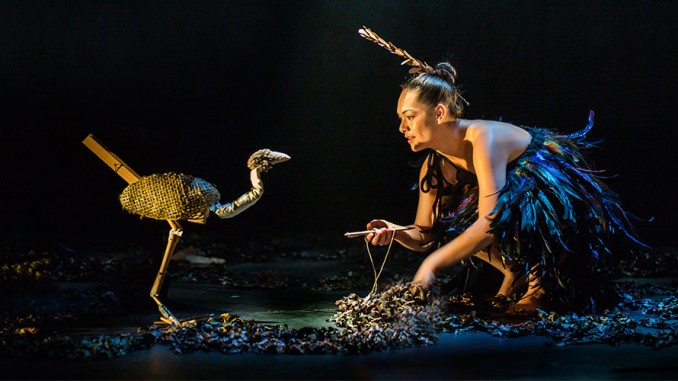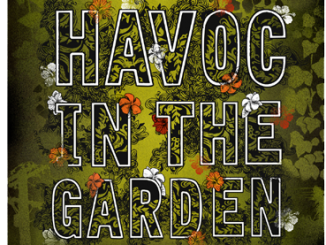
[In Praise of Shadows]
In his famous essay on aesthetics, In Praise of Shadows, Japanese author Junichiro Tanizaki questions the traditional Western ideal of preferring the beauty of light over darkness, stating that the former can’t exist without the latter: “The quality that we call beauty, however, must always grow from the realities of life, and our ancestors, forced to live in dark rooms, presently came to discover beauty in shadows, ultimately to guide shadows toward beauty’s ends.” These words seem highly appropriate to the heart and soul of Marama, a piece that dwells amongst the shadows, evoking a home that is the rooted in tradition but is threatened by the advent of modern civilisation.
At its most basic, Marama is an attempt to represent the destruction of our natural landscapes through deforestation. While it does this, the power of the piece goes beyond that. Led by artistic director Nina Nawalowalo, what the theatremakers of The Conch accomplish is creating a whole world before our eyes. Paying homage to its Pacific heritage without tokenising it.
The first image of Marama sets an impossibly high bar for the show. It’s a spider. Not just any spider, but a spider so realistic I’m hesitant to call it a product of puppetry (even though it is). As it crawls onto stage amongst the forest and the trees, emerging from the fog, it’s impossible not to be immediately fall under its spell. It’s a magical moment so breathtaking I’m afraid it won’t last.
What ensues is physical theatre free of dialogue and exposition, more akin to dance, avoiding narrative description. It is, first and foremost, an aesthetic experience, the labour of its theatre-makers etched into every image. Performing various waiata, chants, dance and rituals, the five women who inhabit this world are Awhina Rose-Henare Ashby, Tupe Lualua, Gloria Konare, Susan Galutia and Grace Tiba. The show is at once a tribute to the landscapes as it is to the Pacific women who inhabit the space, finding a connection between their bodies and the setting. And then there are also the performers left unseen, hidden in the shadows: Kasaya Manulevu, Rudi Miller and Merlin Connell-Nawalowalo. Like the choreography by Sarah Foster-Sproull, their work is no less important because they are invisible.
The incredibly realistic set by Nicole Cosgrove, remounted by John Verryt, works in perfect harmony with Gareth Farr’s textured and natural sound design. They are only equaled by Fabiana Piccioli’s lighting, which doesn’t exist to simply change mood or transition scenes in ways you might expect. What’s on display is a mastery of shadows and depth of field, bringing new meaning to the term smoke and mirrors. This is bar-none some of the finest lighting I’ve ever seen on stage or screen.
But, for all its breathtaking visuals, the middle section of the show becomes frustratingly repetitive. A good majority of it falls into a trap of complacency, lacking dynamism or variation. Nature comes to life, but eventually, at least for myself, the rhythms and tempo of the action lulled me into a trance, and I struggled to stay engaged in the performance. In fact, it risks totally losing me.
And then something changed.
Towards the end of the play, Marama does something audacious. Something that has to be seen to be believed. The best way to describe it would be to say that Marama commits hara-kiri on stage. The show kills itself, the set, the entire world of the play bleeds to death and peels away its skin, leaving only remains. A moment so visceral, so real, that you can practically feel it reverberate through the entire audience. Even the soundscape alters, conveying the conflict between nature and technology. The women bring something new to their performances here too, desperately defending their land with a sudden urgency. This is one of those breathtaking theatrical moments you’re lucky to see maybe two or three times a year.
It’s for that reason alone that Marama is worth seeing. This is a show that rewards the patient, bulldozing expectations and leaving nothing behind but ash and awe. During no point in the show do the themes feel like an overt statement to be spoon-fed to the audience, but a natural progression of the inevitable. If I find it difficult to love the show as a whole, it’s only because it falls short of the perfection it aims for. While necessary in building the world of the play, the middle section feels too impenetrable to me, a slow-burn that borders on mundanity. I leave the play with its opening and ending images echoing in my mind, thankful for having witnessed them, and grateful for the journey. Marama is a call to arms, a demand for us to take action and make change, to protect our land and our people, our homes and our histories. A flawed but powerful work.
Marama is presented by the Conch and Auckland Arts Festival and plays at Q until 6 March. Details see Auckland Arts Festival.
SEE ALSO: Theatreview.org.nz review by Camelle Pink and Metro Magazine review by James Wenley




Leave a Reply